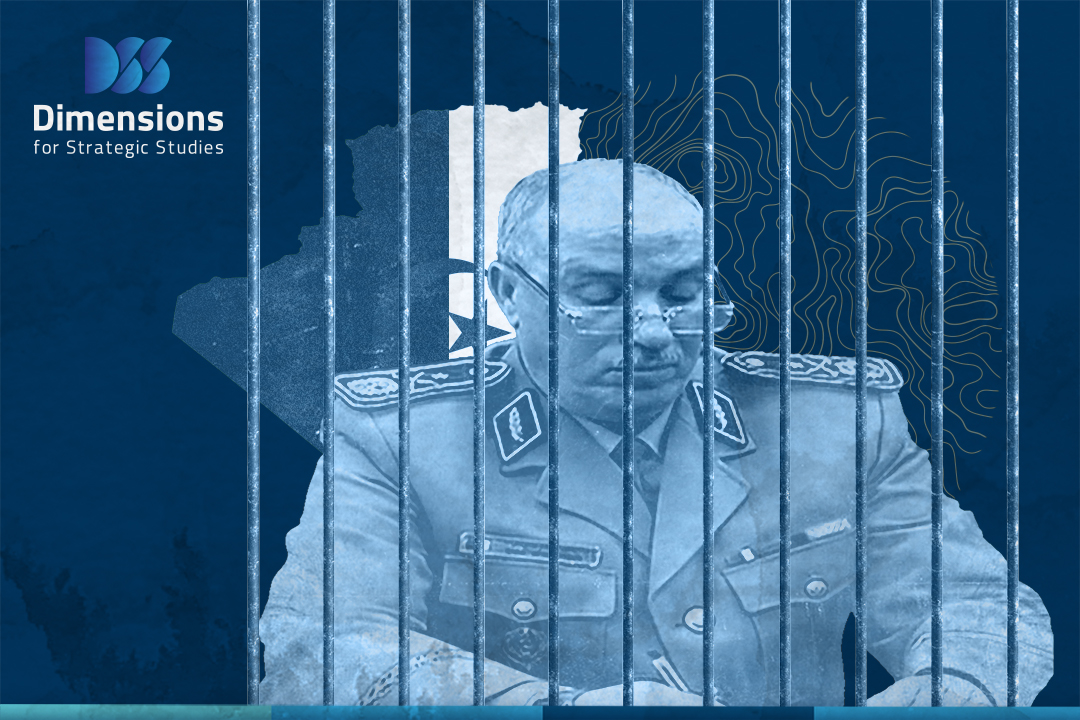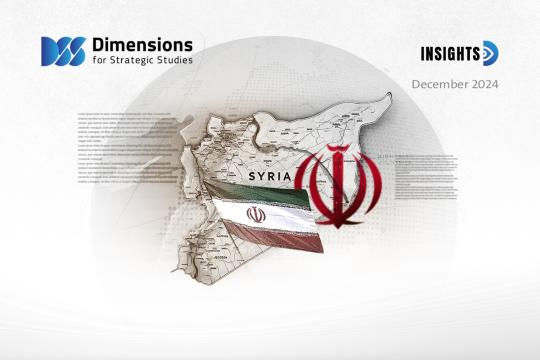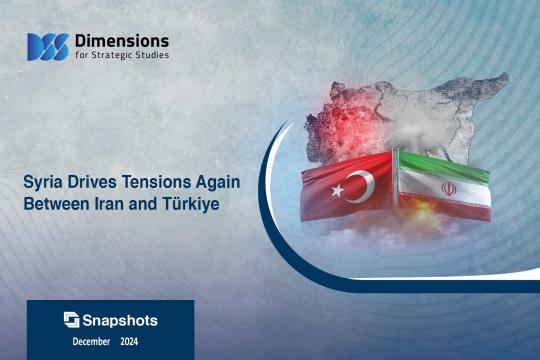
Overthrow of the Director-General of internal security in Algeria
2020-04-189216 view
Introduction
The dismissal of Brigadier General Wassini Bouazza from the position of Director General of Internal Security (Mukhabarat), and the appointment of his deputy, Brigadier General Abdelghani Rachdi in his place was announced in Algeria on April 13th, just five days after Rachdi was appointed as Bouazza's deputy.
Bouazza had ascended to the management of the Internal Security Department of the Algerian intelligence service in April 2019, succeeding General Abdelkader Bouhadeba, who was appointed by former President Abdelaziz Bouteflika on February 13, 2019 to this position.
This came in conjunction with the decision of the military establishment leadership to restore the intelligence service to the army three years after transferring its subordination to the presidency by a previous decision from Bouteflika. The duties of the director of the intelligence service, Lieutenant-General Bashir Tartag, were terminated, and he was succeeded temporarily by General Mohamed Kaidi, who was appointed as the new director of the intelligence service.
In the same month, April 2019, General Ali bin Daoud was dismissed from his post, as Director of the External Security Service- one of the branches of the Intelligence Service- and he was succeeded by Lieutenant-General Mohamed Bouzit.
First: The relationship between Bouazza and Qaid Saleh:
Wassini Bouazza showed absolute loyalty to the military establishment during the days of the late Chief of Staff, Qaid Saleh. He struck with an iron fist the two wings of the presidency and the intelligence services during Bouteflika’s era, when he persuaded Qaid Saleh to arrest all the leaders, Saeed Bouteflika, Mohamed Mediene (Al-Tawfik) and Bashir Tartag.
Relations between Wassini Bouazza and Commander Saleh were direct, away from the Intelligence Department. The dispute between the two men; however, rose in the last presidential elections. While Wassini Bouazza was inclined to nominate the former Minister of Culture, Ezzedine Mihoubi for the presidency, Commander Saleh- and with him the military leadership- was with the nomination of Abdel Majid Tebboune.
There is confirmed information that, Commander Saleh had contracted a disease was admitted to hospital last November. He was then almost absent from the scene. However, when he heard that Wassini Bouazza was backing Azzedine Mihoubi, he became very furious; and he was preparing to depose Bouazza and arrest him. The disease; nevertheless, handicapped him from doing so; then he died.
Wassini Bouazza is described as a strong man; and it was said that he would insult others verbally and sometimes physically, in his office, if they did not listen to his opinion. He gained this strength out of an exaggerated confidence that he had become the strongest man, given the need of the leader Saleh for him, and that of anyone to assume the presidency after the removal of Bouteflika.
Wasini's strength at the personal level did not prevent a change in the overall equation. He is simply part of a security and political mechanism adopted by the military establishment along with external parties. This was evident in the electing Abdelmadjid Tebboune president, who was one of the men Bouteflika relied as head of government and a minister with several portfolios. In other words, he is part of the military junta that brought Bouteflika himself to power at the end of the nineties of the last century.
Second: The conflict with the military team in Taboune's office
Tebboune, who won the presidency, knew that, the strong man, the director of the Internal Security Department, was not a supporter of his in the presidential elections, but rather of Ezzedine Mihoubi. Tabboune; however, refused a direct confrontation with him, not only because of the strong mobilisation in the street at the time; where a strong and experienced security man was needed; but also because Tebboune and those behind him were concerned about the calming down the internal domestic situation and establish the features of foreign policy All that needed time
Wassini Bouazza understood that the political situation was not in his favour; but he nevertheless remained confident that he was still the strongest man، and that he could not be easily removed. President Abdel Majid Tebboune staffed his new office, and it was noticeable that this office included two important names from the former regime: Major General Abdel Aziz Mujahid, and the head of the reconciliation office, Amara Radwan, known as Hajj Radwan. The two were named advisers for security and military affairs respectively. Mujahid, who retired from the army at the rank of major general, occupied several high positions in the military establishment; the last of which was the director of the Military Academy for Various Weapons in Cherchell.
As for General Radwan, he was the director of Lieutenant-General Tawfiq's office for more than 10 years; and he comes from the Kabylie region. He is one of the third generation officers in the army. He joined the army in the seventies with higher academic degrees. He is considered one of the security apparatus’s competencies; and he specializes in the field of military intelligence; so he is a career intelligence man, unlike Wassini Bouazza al-Askari, who has nothing to do with intelligence tasks.
General Radwan is a religious and conservative person. He was not known to be involved in corruption; and he is far from the conflict within the wings. Throughout his period of work in the intelligence services, he was far from conflicts within the military institution, as he is a practical man. Thus, it becomes clear that the removal of Wassini Bouazza serves the interest of President Abdelmadjid Tebboune’s wing; especially, when the parties who brought him to power want to strengthen him. That was also a positive message to the former intelligence wing, specifically Al-Tawfiq and Bashir Tartag, which indicates that the matter is related to a rotation within the military establishment through which weakening or removing the wing of President Abdelaziz Bouteflika can be achieved; especially, when that wing was strong in Bouteflika’s last days. It was simply weakening the intelligence and ending the myth of Altawfiq, the formidable man.
The first step and direct message to Ouassini Bouazza was when the Chief of Staff of the People's National Army, Major General Said Chanegriha, on April 8 (five days before Bouazza's dismissal) appointed Brigadier General Abdelghani Rachdi as Bouazza's deputy with wide powers. Colonel Kamal Eddine Rmeili, Director General of Documents and External Security, the agency that represents the second part of the Algerian intelligence, was dismissed, and Major General Mohamed Bouzit, who had previously held the position; and he was replaced by Major General Mohamed Bouzit, who is one of the most prominent experts of the military establishment in foreign issues.
Third: the consequences of recent changes.
The removal of Wassini Bouazza and his team will not be the end of the conflict between the military, security and political wings. The conflict between the presidential palace and the military establishment will continue; because there is a real conflict of powers, as the presidency in Algeria is no more than a mask for the rule of the military; and it cannot be an independent entity on its own.
The recent changes represent the army’s success in limiting the role of the presidency and the intelligence at the same time, as the army succeeded in restoring intelligence to the military establishment; and they contributed to the formation of President Abdel Majid Tebboune’s office by appointing important military personnel to it.
There is information indicating that Wassini Bouazza was personally responsible for the escalation against the leaders of the movement; and that his department was the one investigating the files of opposition activists. Therefore, it is expected that the new military leadership will calm things down with the activists, especially in light of the security conditions related to the war on the Corona virus. We may witness in the following period, especially during Ramadan and Eid, the gradual release of detainees.
Read more: Overthrow of the Director-General of internal security in Algeria





